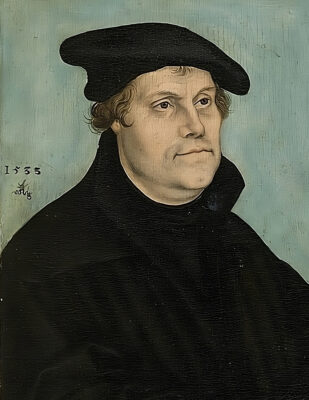The Story Behind: A Mighty Fortress
A Mighty Fortress Is Our God is a cornerstone of modern Christian hymnody. Its origins are every bit as grand as its legacy, being written by one of the most famous and beloved Christians in history, and being used as a battle cry during times of persecution.
The Origins of a Mighty Hymn

Martin Luther, the Great Reformer who sparked the Protestant Reformation, hardly needs an introduction. On October 31, 1517 in Wittenberg, Germany, where Luther lived and taught theology, he nailed his 95 Theses to the door of the Castle Church to challenge the Catholic Church’s sale of indulgences. His ideas, derived from Scripture, advocated for a personal relationship with God over reliance on priests, shifting power from the Catholic Church to the common man. This bold act ignited the decades-long Protestant Reformation. (The 1533 painting here on the left, meticulously crafted on beech wood by Lucas Cranach the Elder, offers a highly accurate depiction due to his close friendship with Martin Luther.)
Music as a Tool for Reform
Did we in our own strength confide, our striving would be losing;
Were not the right Man on our side, the Man of God’s own choosing:
Dost ask who that may be? Christ Jesus, it is He;
Lord Sabaoth, His Name, from age to age the same,
And He must win the battle.
Luther is well known for beginning the Reformation, but is less known for his ongoing fight during it. His passion for each believer to experience a personal relationship with God never budged, and one of his key proposals for such a relationship involved the grand purpose of music. On music, Luther proclaimed, “If any man despises music, as all fanatics do, for him I have no liking; for music is a gift and grace of God, not an invention of men. Thus it drives out the devil and makes people cheerful,” and, “The Devil, the originator of sorrowful anxieties and restless troubles, flees before the sound of music almost as much as before the Word of God.”
So important did Luther deem music, he even stated he “… would allow no man to preach or teach God’s people without a proper knowledge of the use and power of sacred song.” Many of history’s greatest hymns come from reverends soon after Luther’s time, showing the impact he had on congregational worship.
Luther understood that actions speak louder than words. It is how he began the Reformation, and it is how he emphasized the importance of music. Luther took to writing his own hymns; hymns that congregations took joy in singing; hymns that broke the concept of needing a middle man to commune with God.
A Battle Hymn is Born
The greatest hymn by Martin Luther was A Mighty Fortress Is Our God. He wrote it during the darkest time of the Reformation, a time of widespread persecution from the Catholic Church. For the persecuted, no greater words were there to sing than
A mighty fortress is our God, a bulwark never failing;
Our helper He, amid the flood of mortal ills prevailing:
For still our ancient foe doth seek to work us woe;
His craft and power are great, and, armed with cruel hate,
On earth is not his equal.
So powerful was the hymn’s impact during those days that it was dubbed “The Battle Hymn of the Reformation.”
Luther the Musician
There is some debate among scholars as to whether Luther wrote the music to A Mighty Fortress or adapted it from an existing melody. Some sources attribute the tune to Luther himself, based on his musical training and skill. Others suggest that the tune may have been derived from a Gregorian chant or a secular song that Luther modified. The exact origin of the tune is not certain, but it is clear that Luther had a great influence on the development of hymnody and liturgical music in the Protestant tradition. He composed the hymn tune between 1527 and 1529, naming it EIN FESTE BURG from the first line of the text. The tune is in a rhythmic meter that differs from the later isometric version that is more commonly used today. Luther was a skilled musician who played the lute and the flute, and he wrote many hymns to express his faith and encourage congregational singing.
Enduring in Translation: The English Versions of a Mighty Hymn
Though originally written in German by Martin Luther, A Mighty Fortress Is Our God has been translated into many languages over the centuries, including several popular English versions. One of the earliest and most poetic English translations was done in the 19th century by Thomas Carlyle, a Scottish historian and essayist with great admiration for Luther. Carlyle’s translation, beginning “A safe stronghold our God is still”, captures the beauty and strength of Luther’s original German lyrics.
However, Carlyle’s version is less literal and not as widely used in English-speaking Protestant churches as some other translations. The most popular version outside of Lutheran denominations is by Frederick H. Hedge from 1853, beginning “A mighty fortress is our God, a bulwark never failing.” Another oft-used translation is the composite version from the 1868 Pennsylvania Lutheran Church Book, which starts “A mighty fortress is our God, a trusty shield and weapon.” In recent decades, the 1978 translation from the Lutheran Book of Worship (“A mighty fortress is our God, a sword and shield victorious”) has also gained popularity among English-speaking Lutherans.
Early Publications
Joseph Klug’s Wittenberg hymnal was one of the earliest publications that included the hymn A Mighty Fortress. It was printed in 1529, shortly after Luther wrote the words and composed the tune. However, no copy of this hymnal remains today, so the exact form of the hymn as it appeared in Klug’s edition is unknown. The oldest surviving hymnal that contains the hymn is that of Andrew Rauscher, printed in 1531. Klug’s Wittenberg hymnal was part of Luther’s effort to promote congregational singing and to provide a collection of hymns in German for the reformed liturgy.
Regardless of translation, the enduring legacy and influence of this mighty hymn continues to resonate in churches across languages and denominations today.
Frequently Asked Questions (FAQ)
Q: Where in the Bible does it say A Mighty Fortress Is Our God?
A: The hymn’s title and themes are inspired by Psalm 46, verse 1, which in Luther’s German Bible translation states: “God is our refuge and strength, a very present help in trouble” (Ein feste Burg ist unser Gott). The hymn paraphrases concepts from this psalm about God being a stronghold and refuge for His people amid life’s trials. However, the exact wording “A mighty fortress is our God” does not appear verbatim in the Bible. Luther synthesized ideas from Psalm 46 into his own lyrical paraphrase that became a cornerstone hymn of Protestant tradition.
Q: What does A Mighty Fortress Is Our God mean?
In the 16th century when Luther wrote this hymn, fortresses and castles were common strategies for military defense. A fortress provided safety and protection for a town or city from attacking forces.
The “mighty fortress” metaphor draws on this context. It conveys the idea of God as an impenetrable stronghold defending believers against the attacks of the devil and all evil. Just as a fortress shields a city from harm and prevails against siege, God provides an unfailing refuge for His followers amid life’s hardships and trials.
A Mighty Fortress Is Our God Lyrics
If the powerful words of A Mighty Fortress Is Our God resonate with you and you wish to delve deeper into its lyrics, visit hymndex.com. This website offers a vast collection of hymn lyrics that can help churches create lyric slides for worship.
Download sheet music, chord charts, tracks, multitracks and instrumental parts for A Mighty Fortress Is Our God exclusively with a hymncharts subscription. You won’t find this arrangement on any other website.


